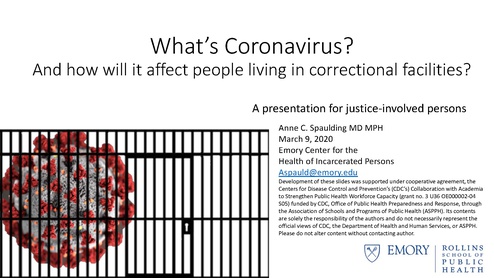Emory CHIC, Coronavirus for Justice-Involved Persons, 2020
Download original document:

Document text

Document text
This text is machine-read, and may contain errors. Check the original document to verify accuracy.
What’s Coronavirus? And how will it affect people living in correctional facilities? A presentation for justice-involved persons Anne C. Spaulding MD MPH March 9, 2020 Emory Center for the Health of Incarcerated Persons Aspauld@emory.edu Development of these slides was supported under cooperative agreement, the Centers for Disease Control and Prevention’s (CDC’s) Collaboration with Academia to Strengthen Public Health Workforce Capacity (grant no. 3 U36 OE000002-04 S05) funded by CDC, Office of Public Health Preparedness and Response, through the Association of Schools and Programs of Public Health (ASPPH). Its contents are solely the responsibility of the authors and do not necessarily represent the official views of CDC, the Department of Health and Human Services, or ASPPH. Please do not alter content without contacting author. What is Coronavirus? What is COVID-19? You may have heard about “the new coronavirus” This is a virus particle magnified a zillion times There are many types of viruses out there. Most coronaviruses cause a mild cold. The “new coronavirus” causes a disease called “COVID-19”. Some infections are mild. Some people get a cough, fever and shortness of breath. A few need to be hospitalized. Some people are dying, but at a lower rate than with other epidemics like SARS. The New Coronavirus Overview: Spread • This virus spreads from person-to-person • When people are in close contact, about 6 feet of each other or closer. • The longer you are close together, the higher the likelihood of spread. • When you cough or sneeze, droplets with virus particles spread in the air. Droplets can land in mouths or noses of people nearby. • Droplets can be inhaled into the lungs. • Sometimes a jail or prison will want to separate sick people and people who don’t have the infection. With an outbreak, visitation may be stopped. The New Coronavirus Overview: Spread “Novel” is another word for new. Some people refer to this as “The Novel Coronavirus” • The new virus can spread by touching with bare hands a surface or object that has the virus particles on it, such as a used tissue. • This is not the main way the virus spreads! • The novel coronavirus can spread at different stages of sickness • People are thought to be most contagious when they are sickest. • People might be contagious before they even show symptoms, but probably most people with COVID-19 did not catch the virus from folks who are still well. New Coronavirus Overview: Spread • It started in China • As of March 2020, it has spread to every continent. • COVID-19 seems to be spreading easily in many communities Persons entering jails or prisons can bring it in with them. If it’s in a community, it’s likely to show up in their local jail (or prison). New Coronavirus Overview: Prevention—Avoid Exposure! • Avoid close contact with people who are sick. • Avoid touching your eyes, nose, and mouth. • Cover your cough or sneeze with a tissue. • Throw the tissue in the trash. • Wash your hands often with soap and water for at least 20 seconds. • As long as singing Happy Birthday song! • Ask for a facemask if you have a cough; encourage those who have a cough to ask for a facemask. IMPORTANT! Masks like these pictured here are for people who are sick, to prevent them from spreading the infection to others. They are not meant to protect healthy people from getting sick!! New Coronavirus Overview: Symptoms • Many infected people have reported mild symptoms or no symptoms at all • Symptoms can appear soon or long after contact with an infected person • This could be 2 days, 2 weeks, or sometime in between! • Serious disease and death are most common in • Older persons • Those with underlying medical conditions New Coronavirus Overview: Treatment • What is recommended to treat those already sick? • • • • Rest Drink fluids Take medicine to reduce fever (for example, acetaminophen). Research is ongoing to use already-developed medications to better treatment. • Is there a shot to prevent Coronavirus? • No vaccine yet; • Research is ongoing to develop a vaccine to prevent infection New Coronavirus Overview: Incarceration • Prisons and jails are enclosed environments • Incarcerated persons sleep in close quarters, eat together, recreate in small spaces, and may be at increased risk for airborne infections due to close contact If you: Develop symptoms of COVID-19, Have been in close contact with someone with COVID-19, or Have recently traveled from/through an area with widespread cases, Let health services know! Resources: • https://www.cdc.gov/coronavirus/2019-ncov/index.html • https://www.bop.gov/resources/pdfs/seasonal_influenza_guidance.pdf • Questions? Aspauld@emory.edu • Emory Center for the Health of Incarcerated Persons, Atlanta GA • Acknowledgments: I am grateful for constructive criticism from countless colleagues. 3/9/2020





